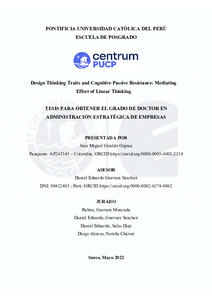| dc.contributor.advisor | Guevara Sanchez, Daniel Eduardo | |
| dc.contributor.author | Giraldo Ospina, Juan Miguel | |
| dc.date.accessioned | 2022-05-26T16:34:36Z | |
| dc.date.available | 2022-05-26T16:34:36Z | |
| dc.date.created | 2022 | |
| dc.date.issued | 2022-05-26 | |
| dc.identifier.uri | http://hdl.handle.net/20.500.12404/22449 | |
| dc.description.abstract | El propósito de este estudio es vincular teóricamente el design thinking con la estrategia
conductual, a partir de resultados empíricos que relacionan tres dimensiones cognitivas: los
rasgos del design thinking, la resistencia pasiva cognitiva y el pensamiento lineal; y, en
consecuencia, determinar: si existe una relación negativa entre los rasgos del design thinking y
la resistencia pasiva cognitiva y si esta relación está mediada por el pensamiento lineal. Para
probar estas hipótesis, se realizó un estudio cuantitativo mediante el modelado de ecuaciones
estructurales basado en la covarianza CB-SEM, a una muestra de 342 profesionales de
ingeniería y administración en Colombia, determinando primero el efecto directo de la relación
entre los rasgos de pensamiento de diseño y la resistencia pasiva cognitiva; y posteriormente
determinando la relación entre los rasgos del design thinking y el pensamiento lineal; la relación
entre el pensamiento lineal y la resistencia pasiva cognitiva, y el efecto mediador del
pensamiento lineal en la relación entre los rasgos del design thinking y la resistencia pasiva
cognitiva.
Los resultados mostraron que existe: 1.) Una relación negativa entre los rasgos del
design thinking y la resistencia pasiva cognitiva; 2.) Una relación negativa entre los rasgos del
design thinking y el pensamiento lineal; 3.) Una relación positiva entre el pensamiento lineal y
la resistencia pasiva cognitiva; y 4.) El pensamiento lineal media la relación entre los design
thinking y la resistencia pasiva cognitiva; confirmando las hipótesis planteadas, y vinculando
el concepto del design thinking con el campo de estudio de la estrategia conductual, con la
intención de apoyarlo teóricamente como lo viene reclamando la literatura. | es_ES |
| dc.description.abstract | The purpose of this study is to theoretically link design thinking with behavioral
strategy, using empirical results that relate three cognitive dimensions: design thinking traits,
cognitive passive resistance and linear thinking; and, consequently, determine: if there is a
negative relationship between design thinking traits and cognitive passive resistance and if this
relationship is mediated by linear thinking. To test these hypotheses, a quantitative study was
conducted by means of structural equation modelling based on CB-SEM covariance, to a
sample of 342 engineering and management professionals in Colombia, determining first the
direct effect of the relationship between design thinking traits and cognitive passive resistance;
and subsequently determining the relationship between design thinking traits and linear
thinking; the relationship between linear thinking and cognitive passive resistance, and the
mediating effect of linear thinking in the relationship between design thinking traits and passive
cognitive resistance.
The results showed that there is: 1.) A negative relationship between design thinking
traits and cognitive passive resistance; 2.) A negative relationship between design thinking
traits and linear thinking; 3.) A positive relationship between linear thinking and cognitive
passive resistance; and 4.) Linear thinking mediates the relationship between the design
thinking traits and cognitive passive resistance; confirming the hypotheses proposed, and
linking the concept of design thinking with the field of study of behavioral strategy, with the
intention of supporting it theoretically as the literature has been claiming. | es_ES |
| dc.language.iso | eng | es_ES |
| dc.publisher | Pontificia Universidad Católica del Perú | es_ES |
| dc.rights | info:eu-repo/semantics/closedAccess | es_ES |
| dc.subject | Pensamiento creativo | es_ES |
| dc.subject | Aptitud creadora en los negocios | es_ES |
| dc.subject | Innovaciones tecnológicas | es_ES |
| dc.subject | Aprendizaje cognitivo | es_ES |
| dc.title | Design thinking traits and cognitive passive resistance: mediating effect of linear thinking | es_ES |
| dc.type | info:eu-repo/semantics/doctoralThesis | es_ES |
| thesis.degree.name | Doctor en Administración Estratégica de Empresas | es_ES |
| thesis.degree.level | Doctorado | es_ES |
| thesis.degree.grantor | Pontificia Universidad Católica del Perú. CENTRUM | es_ES |
| thesis.degree.discipline | Administración Estratégica de Empresas | es_ES |
| renati.advisor.dni | 09412483 | |
| renati.advisor.orcid | https://orcid.org/0000-0002-6374-8062 | es_ES |
| renati.author.pasaporte | AP243345 | |
| renati.discipline | 413038 | es_ES |
| renati.juror | Rubén Guevara Moncada | es_ES |
| renati.juror | Daniel Eduardo Guevara Sanchez | es_ES |
| renati.juror | Daniel Eduardo Salas Diaz | es_ES |
| renati.juror | Diego Alonso Noreña Chavez | es_ES |
| renati.level | https://purl.org/pe-repo/renati/level#doctor | es_ES |
| renati.type | https://purl.org/pe-repo/renati/type#tesis | es_ES |
| dc.publisher.country | PE | es_ES |
| dc.subject.ocde | https://purl.org/pe-repo/ocde/ford#5.02.04 | es_ES |





